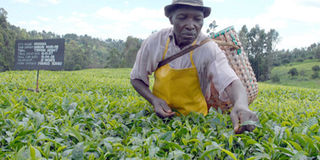Tea price rises from three-month low on Egypt stability

What you need to know:
The price of tea has risen to Shs4,753, up from Shs3,753 three months ago.
Relative stability in Egypt has helped reverse a drop in the price of tea, giving tea farmers and processors a reason to hope for the best.
According to industry players for the last three months a kilogramme of tea on the international market would fetch between Shs3,753 ($1.5) and Shs4,509 ($1.8) from an earlier average price of Shs5,254 ($2.1).
But beginning a fortnight ago, the price per kilogramme was fetching not less than Shs4,753 ($1.9). This, according to the processors, is an indication of good times ahead.
“Industry players and particularly the tea farmers cannot survive if the prices does not pick up fast,” Mr George William Sekitoleko, the executive secretary of Uganda Tea Association, said in an interview with Prosper last week.
What low prices mean
He continued: “The dangers of prices falling down is that the farmers can opt out and that is not good for the industry and the economy whose back bone is said to be agriculture.”
With relative stability in Egypt and new markets opening up in the Middle East, the prices of tea will continue picking up. However as long as clouds of uncertainty continue to hover over particularly Egypt, one of the biggest buyers of Ugandan tea, the prices could take a tumble.
“Stability in Egypt and now Pakistan is crucial in stabilising tea prices. And this has not been helped by the fact that Kenya has also over produced,” Mr Sekitoleko said.
In an earlier interview with Mr Silver Ojakol, the commissioner of external trade, the situation in Egypt will not just affect tea but also coffee companies whose raw materials are processed there before being packaged and sold as finished goods to the international market.
Better quality needed
He said the secret to better price lies in improving the quality of the cash crop. Additionally, farmers and processors need to do more to improve their yield.
According to earlier predictions, the country is estimated to produce between 50,000 tonnes and 60,000 tonnes of tea, a minor improvement from 56,000 tonnes that was produced two years ago.




